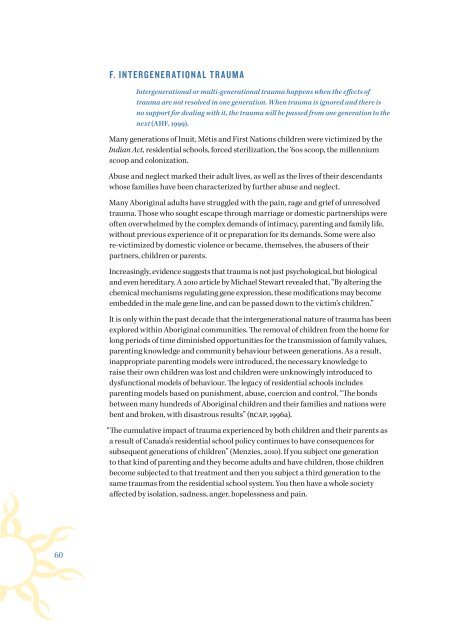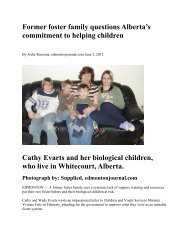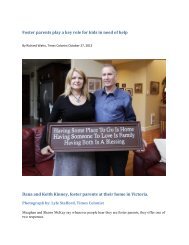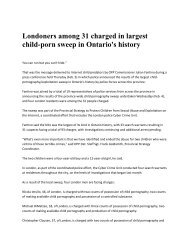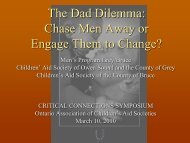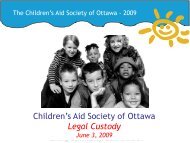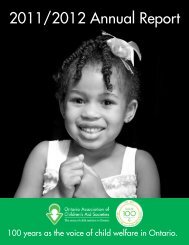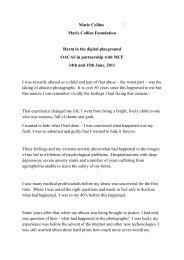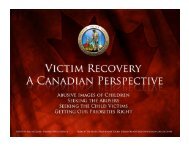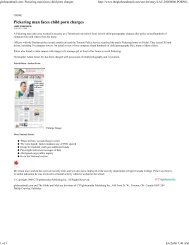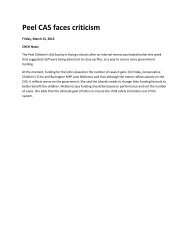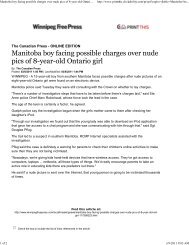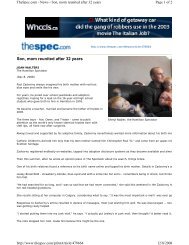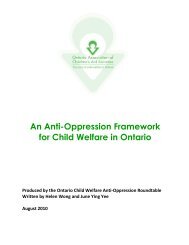English - Ontario Association of Children's Aid Societies
English - Ontario Association of Children's Aid Societies
English - Ontario Association of Children's Aid Societies
You also want an ePaper? Increase the reach of your titles
YUMPU automatically turns print PDFs into web optimized ePapers that Google loves.
F. INTERGENERATIONAL TRAUMA<br />
Intergenerational or multi-generational trauma happens when the effects <strong>of</strong><br />
trauma are not resolved in one generation. When trauma is ignored and there is<br />
no support for dealing with it, the trauma will be passed from one generation to the<br />
next (AHF, 1999).<br />
Many generations <strong>of</strong> Inuit, Métis and First Nations children were victimized by the<br />
Indian Act, residential schools, forced sterilization, the ‘60s scoop, the millennium<br />
scoop and colonization.<br />
Abuse and neglect marked their adult lives, as well as the lives <strong>of</strong> their descendants<br />
whose families have been characterized by further abuse and neglect.<br />
Many Aboriginal adults have struggled with the pain, rage and grief <strong>of</strong> unresolved<br />
trauma. Those who sought escape through marriage or domestic partnerships were<br />
<strong>of</strong>ten overwhelmed by the complex demands <strong>of</strong> intimacy, parenting and family life,<br />
without previous experience <strong>of</strong> it or preparation for its demands. Some were also<br />
re-victimized by domestic violence or became, themselves, the abusers <strong>of</strong> their<br />
partners, children or parents.<br />
Increasingly, evidence suggests that trauma is not just psychological, but biological<br />
and even hereditary. A 2010 article by Michael Stewart revealed that, “By altering the<br />
chemical mechanisms regulating gene expression, these modifications may become<br />
embedded in the male gene line, and can be passed down to the victim’s children.”<br />
It is only within the past decade that the intergenerational nature <strong>of</strong> trauma has been<br />
explored within Aboriginal communities. The removal <strong>of</strong> children from the home for<br />
long periods <strong>of</strong> time diminished opportunities for the transmission <strong>of</strong> family values,<br />
parenting knowledge and community behaviour between generations. As a result,<br />
inappropriate parenting models were introduced, the necessary knowledge to<br />
raise their own children was lost and children were unknowingly introduced to<br />
dysfunctional models <strong>of</strong> behaviour. The legacy <strong>of</strong> residential schools includes<br />
parenting models based on punishment, abuse, coercion and control. “The bonds<br />
between many hundreds <strong>of</strong> Aboriginal children and their families and nations were<br />
bent and broken, with disastrous results” (RCAP, 1996a).<br />
“The cumulative impact <strong>of</strong> trauma experienced by both children and their parents as<br />
a result <strong>of</strong> Canada’s residential school policy continues to have consequences for<br />
subsequent generations <strong>of</strong> children” (Menzies, 2010). If you subject one generation<br />
to that kind <strong>of</strong> parenting and they become adults and have children, those children<br />
become subjected to that treatment and then you subject a third generation to the<br />
same traumas from the residential school system. You then have a whole society<br />
affected by isolation, sadness, anger, hopelessness and pain.<br />
60


